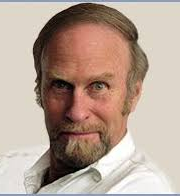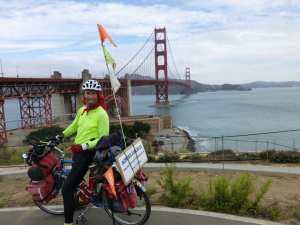What’s It Like To Be A Baby Boomer?
 Frosty Wooldridge
Frosty Wooldridge
Part 1: Becoming a baby boomer after World War II, the early years
On January 26, 1947, my mother gave birth to her first-born child. That 8-pound 12 ounce bouncing baby boy turned out to be yours truly. Since my father, a Reed City, Michigan boy, and U.S. Marine M/Sgt. Howard Wooldridge, returned from fighting in the Marshall Islands, my birth took place at the Great Lakes Naval Air Station, Illinois, just north of Chicago.
Within weeks, we moved back to our 80-acre farm in LeRoy, Michigan, a farming town of 500, which by the way, in 2019, still sports 500 farmers. It’s a sleepy little berg south of Cadillac, Michigan on old 131. It features rolling hills, massive maple-pine-poplar forests, many lakes and lots of rivers. If you visit, you might see fields of hay, corn, wheat, barley and numerous barnyards with old-style barns, most of them red.
In our 120-year-old farm house, I grew up with four siblings. My younger years saw me using an outhouse until age seven. We took baths in a tub until I turned seven when we finally installed a toilet and shower. Wow, hot water, a sink in the kitchen and a Maytag stove that still works today. We finally replaced the 50-year-old refrigerator, NOT because it broke, but because it became too small for our needs. Needless to say, back then, they built stoves and fridges to last.
 Once during my childhood, with my long johns drooping on my body, I had to stoke the furnace with coal in the middle of the night. Snow fell everywhere during a normal Michigan winter with 10-foot snow drifts. I finished shoveling coal into the Holland Furnace, but needed to visit the outhouse. Can you imagine a young kid with boots, trudging through three feet of snow to get to the outhouse in the dead of night? Only the yard light gave me an indication of the location of the outhouse in the middle of the darkness.
Once during my childhood, with my long johns drooping on my body, I had to stoke the furnace with coal in the middle of the night. Snow fell everywhere during a normal Michigan winter with 10-foot snow drifts. I finished shoveling coal into the Holland Furnace, but needed to visit the outhouse. Can you imagine a young kid with boots, trudging through three feet of snow to get to the outhouse in the dead of night? Only the yard light gave me an indication of the location of the outhouse in the middle of the darkness.
Upon opening the door, that same “outhouse odor” slammed into my nostrils. Cob webs in the corners, and a Sears Magazine for toilet paper. I don’t mind telling you that I came from humble beginnings. A Sears Magazine is about as humble as it gets for toilet paper.
When I sat down, that -10 degrees F felt like sitting on a frozen doughnut. It about causes your rear end to jump from the seat, but then, you’ve got to get your business done, so you force yourself to stay on that iceberg seat.
Later, I trudged through the snow, back into the house, and crawled under my quilt to sleep the rest of the night away.
For breakfast before school, I walked up to my grandfather’s barn up the hill 100 yards to milk the cows, and then, bring home a gallon of fresh milk. In the early morning darkness, my imagination ran wild with the prospect of some monster jumping out of the bushes to eat me. We were too poor for a flashlight, so I suffered regularly from certain death by unknown demons.
Mom cooked oatmeal and baked bread. My siblings and I enjoyed homemade blackberry jam, butter and toast.
As we grew older, we watched grandpa place chickens onto a wooden horse and take an ax to their necks. We thought it quite humorous to see a chicken running around without its head. That’s where the adage originated, “Running around like a chicken with his head cut off.” Of course, today, kids would never understand that idiom. Same with “getting down to brass tacks.” Heck, kids today lack any understanding about the origins of America, or for that matter, where our food and milk originated. Most city kids, glued to their cell phones from age 8 onward, think food comes from a grocery store. They can’t imagine seeing a bloody deer, cow or chicken carcass being butchered and prepared for human consumption. They don’t possess a clue that milk comes from the udders of a cow. Same with chicken eggs. We used to collect them from the hen house.
I attended LeRoy Elementary School. My father and mother told me to always do my studies and homework first, and then, play sports. Best advice I ever received in my youth. As I grew taller at 6’2 ½”, I became a shortstop in baseball and guard in basketball.
Of course, the older I became, the more my parents and grandparents put upon me to work. Spring wheat saw me working my rear-end off. That old 1949 B John Deere tractor ran from dawn to dusk with me in the driver’s seat cutting hay. Then, baling it, loading it and slamming those 60-pound bales into the barn loft. Seems like I cultivated the corn until it grew over my head.
On Sundays, we attended church. By mid-summer, we picked all the vegetables out of the garden for canning. We picked blue berries, and later, apples for apple sauce. My mom canned everything for winter stores. We also played a lot of baseball catching and hitting. I built a basketball hoop in our adjacent cow pasture. And yes, fishing out of a rowboat, much better than a therapist. I enjoyed my childhood with my three brothers and sister.
One thing about growing up on a farm: you’re wanted, you’re needed and you learn the value of hard work and healthy living. You’re also very close to Nature which gives you a balance that stays with you all your life.
But then came 9th grade with bullies who got a kick out of busting me in the arm with their fists. Because I became tall and athletic, I got a taste of the male pecking order. If they couldn’t compete with me on the athletic field, they decided to beat the crap out of me off the field.
My dad said, “Son, they might make a meal out of you…but you stand your ground…and just land one punch that they’ll remember…and they won’t bother you anymore.”
Dad called it! The next time Bobby Varnado hit me going down the hall, and then, shoved a pencil up my butt when I walked back to my seat, I turned around and gave him a black eye he remembers to this day. At every 10-year reunion, he remembers that I busted him up pretty damned good. He never bothered me again.
Coming in Part 2: High school years, college, US Army, Vietnam
© 2019 NWV – All Rights Reserved
E-Mail Frosty: frostyw@juno.com